- Home
- Alex Segura
Bad Beat
Bad Beat Read online
Pete Fernandez reached for the flask and stopped midway. It was empty. Drained on the way over. He exhaled and looked at the worn reporter’s notebook resting on the steering wheel of his battered teal Saturn SL2. He pulled a pen out of his pocket and hovered over the cluttered top sheet.
Focus. He had to focus. His head felt fuzzy and the contents of the flask hadn’t washed away last night’s hangover. His mouth was dry and he was on deadline.
His cell phone buzzed in his pocket and he struggled to get the tiny flip phone loose. He looked at the small display before answering. Shit. Hal Bradley, the assistant sports editor at The Bergen Light.
Pete used to like Hal. That felt like a long time ago.
“Fernandez,” Bradley said, not bothering with pleasantries. “What’ve you got for me?”
“Just got to the bar,” Pete said. “Going over my notes.”
Bradley’s sigh was long and pronounced. They were entering last-straw territory.
“Listen, Pete,” Bradley’s voice softened. “I know you’re going through some shit. We’re all sorry about,” he paused for a beat. “Look, we’re sorry about your father. But this story is going to be a shark for us. A big shark. I need you to shake some mojo loose and get this one.”
“I’ll nail it, Hal,” Pete said before hanging up, not even believing himself. Not reacting to Bradley’s awkward condolences.
“I’m money when it comes to stories like this,” he said to himself, not entirely convinced.
The story wasn’t much of anything yet—it hinged on a tipster’s call Pete got early that morning, in between a trip to the kitchen through his empty apartment for water and Motrin before crashing back into bed. His fiancée Emily had bailed pre-dawn early. Something about running errands or a book club.
The young-sounding voice on the phone connected a few dots he’d long suspected of belonging together: that hometown QB, Raleigh “The Gun” Davis, the golden-armed star of the painfully mediocre Rutgers football team—and therefore the only one with big league prospects— was a little too invested in how other college football games ended.
As in, he was betting on games like it was his job.
Pete wasn’t sure how the tipster got his number, but it wasn’t the first time it had happened. Pete was easy to track down. He’d built a rep over the last few years of being in the wrong spot at the right time. Once upon a time, he’d been hungry.
Pete was the only reporter who showed up to the coach’s press conference. Digging through the athletic director’s trash to see what memos he’d shredded. Tailing the star point guard to the after hours club to sneak a few photos of him doing blow off a stripper’s bare ass.
After a while, though, the reporting was replaced by solo visits to bars or boozy lunches with sources that turned up a lot of garbage, only half of it making it to ink on the page. And only half of that worth the time and cost. The editors began to notice. His father’s sudden death had only bought Pete a short-term respite from the stern talking-tos and demotions. Once the “enterprise” sports reporter at the paper—meaning he got to pick his assignments and work up lengthy, feature-style investigative pieces—he was now relegated to being the “B” reporter on the Rutgers beat.
The “B” did not stand for “better”.
The pity party wasn’t going to last much longer. He had a plane ticket back to his sun-drenched shithole of a hometown, Miami, taking off tomorrow afternoon. Once he and Emily made it back to Jersey from the funeral and all the post-mortem legwork kids have to do when their parents drop dead, he’d be back where he left off: on the brink of losing his job and not giving a shit.
He didn’t let himself think about the last time he’d spoken to his father, who had been a homicide cop back home. His memory often lingered on that voicemail Pete didn’t return because he was seven vodka sodas deep at some Jersey City bar with a group of strangers.
He coughed as his eyes began to water. He slid the notebook into his back pocket, got out of the car, and marched toward his destination.
Jester’s was a no-class corner bar. The kind of dive that didn’t have any personality of its own, littered with unremarkable signs, carbon copy beers on tap and well drinks that tasted like chlorine. It was a charmless dump. But Jester’s was a charmless dump on Church Street, a few miles from Rutgers. It was also the kind of joint that didn’t card college students, making it Pete’s first stop on his hunt for Raleigh Davis.
He didn’t expect to hit pay dirt. His notepad was littered with bars and clubs that “The Gun” frequented. Davis was beloved because he was a hardworking kid with a flair for the wild and shameless. His Facebook page alone was a testament to that. Guy liked to party. He really liked to hang out with pretty girls.
Worst-case, Pete could at least get a drink to tide himself over for a bit. Maybe a double. It’s not like his editor was watching.
Pete pushed open Jester’s heavy wooden front door and almost stopped before entering.
At the empty main bar, situated to the left of the door, was Davis.
It was easy to see why women responded to him, outside of the whole star quarterback thing. Tall and lean with a shaved head and easy smile. Usually. As he sat at the bar, tapping his thumbs on his iPhone as if he were writing a term paper by text, his face was firmly pointed south. Davis looked up as the dull door chime signaled that someone was coming in, and made eye contact with Pete.
Davis put his phone in his jacket pocket and got up from the stool, trying to look casual, not doing a very good job of it. He was heading toward the back of the bar, into an area that housed the more traditional restaurant seating, decorated with pictures of the owner hugging second-rate celebs and local sports heroes. Corey Feldman is not an indicator of quality.
Pete followed, already spotted but still trying to play it like a drunk looking to take a piss.
He was a few paces behind Davis, gaining a bit of speed with each step. Pete’s head was like sludge, the synapses not really firing at the right time. He had no idea what’d he’d ask the kid, much less the line of questions he’d ask to set him up for the clincher. This used to come so naturally.
Before he could consider his approach any further, someone slammed into Davis, sending both of them sprawling into the dining room.
Ash McKenna took one last drag of his cigarette, so deep it singed the filter, then tossed the spent butt to the curb and pulled out his phone. Another text from Raleigh was waiting on the screen. The brevity of text messages didn’t usually do much for conveying tone. Still, this one was like an accusation.
Where are you?
Ash wrote back: Be there shortly.
Raleigh responded instantly, like he was sitting there with the phone in his hand: Hurry man.
Next time let’s not meet in the middle of nowhere.
Ash stuck the phone in his pocket and walked down a tree-lined block, past dark, quiet homes set back from the street. The bar was supposed to be another block down. Two miles from the nearest train station.
Two miles in Manhattan was a breeze. It felt like so much more than anyplace else. Ash cursed himself for not finding a cab, but how the hell are you supposed to get a cab besides walking to the curb and sticking out your hand? Here you have to call ahead. You have to know specific addresses. It was barbaric. New Jersey ought to be illegal.
Ash had begged Raleigh to come into the city for this meeting, but Raleigh was skittish about straying too far from Rutgers. Couldn’t be blamed for that, given the situation, so Ash set about trying to figure out the PATH train system.
It had been three or four years since Ash had seen Raleigh, so as soon as he got the call, Ash knew something was wrong. There was the panic in his voice, sure, but Raleigh didn’t even have Ash’s number. Even worse, he st
arted with the same thing most people start with when they called Ash.
“I’ve heard things about you.”
Once, a long time ago and far away, they were two dumb kids running around the West Brighton neighborhood of Staten Island. Not best friends, but their paths crossed occasionally, at Silver Lake Park or Cafe Milano. They played on the same little league team at Snug Harbor. They were friendly enough to always shake hands on the odd occasion they’d run into each other.
Then they moved on. Raleigh to Jersey for football and a pipe dream of making it to the NFL, Ash to Manhattan for a drug-binge of bad decisions he’d convinced himself was a life.
People say Staten Island is the last stop, dead end worst part of New York. That’s not true. The last stop, dead end worst part of New York is New Jersey, because New Jersey thinks it’s got a welcome spot at the metropolitan table.
Two miles and Ash hadn’t seen a bus or a cab. Not a bodega or a business of any kind. The place was barely alive. On life support.
There was a flash of neon in the distance. A sign that said ‘Jester’s’ buzzing purple against the black night. Ash contemplated one more cigarette before going in, but his phone buzzed again, probably Raleigh freaking out, so Ash didn’t reach for the smokes, just kept trudging on.
He ran through the earlier phone call in his head, prepping for what this job would entail.
Raleigh had a gambling thing. Ash didn’t want to call it a problem, because acceptance is the first step, and Ash wasn’t willing to put that on someone. To tell someone else they had a problem. Who was he to talk, with the laundry list of substance abuse that made up his day?
At least it was for a good cause. Sure, Raleigh seemed to dig the rush. But his mom was sick—some kind of slow-eating cancer, Ash recalled. A lot of the money Raleigh won was getting funneled straight into an insurance company’s pocket. .
And it was going pretty well. Until Raleigh got overconfident. Now he was so deep in debt, his bookie asked him to shave points. Raleigh agreed until he was on the field, didn’t want to let anyone down, team spirit, rah-rah, and ended up winning the game.
The bookie lost a lot of money and was kind enough to not break his legs.
Still, said bookie wasn’t exactly magnanimous, and snatched his sister, Nariah, to ensure Raleigh would successfully shave points in the championship game tomorrow night.
Ash remembered Nariah real good.
Tall, pretty, long wild hair that went down to her ass. Even when they were kids, he had a crush on her. But she was two years older than them, and treated Ash and the rest of the boys who pined after her like they were ten years younger. Ash hadn’t seen her in longer than he’d seen Raleigh.
They were adults now. Maybe he could talk her into getting a drink afterward. After all, he was about to play knight-in-shining-armor. That tended to smooth things along.
Not that it’s the reason Ash took the job. Raleigh was a nice guy who’d been kind to him and had a bright future. More than Ash could say for himself. It was a chance to do a little good, and it had been awhile since Ash had done something to be proud of. Mostly lately, he’d been running drugs and protection games for Ginny Tonic, and that’s a story best forgotten.
Ash got to the door of the bar and checked his phone. The latest text from Raleigh: I’m nervous—what if someone sees us?
Raleigh might just be paranoid, but Ash learned long ago to play it safe on unfamiliar turf. There was a door at the back of the building so he headed for that, found a separate entrance to a dining area. The door was open so he stepped inside a big, dark room with a few tables draped in white linen. Lots of wood trim and forest-green paint on the walls, so that with the lights out it looked even darker than it should have.
He walked through to where he could get a glimpse out into the bar area, and saw Raleigh sitting at a stool, hunched over his phone. Jester’s was a real dive, not dive chic, and it was full of mostly regulars who didn’t want to be bothered, especially not to look up.
Ash pulled out his phone and wrote: I’m in the back room.
He put away his phone and waited. Within a few seconds he heard footsteps, then Raleigh crossed the threshold. It had been a while. Raleigh always had close-cropped hair. Now it was shaved bald. He was bigger, too, around the shoulders and the neck. The football team had been good to him. Not that he was ever in poor shape, but now he looked more filled out.
The two of them made eye contact. Ash felt a swell of nostalgia at seeing him. It was nice to see people from back when he liked himself. He rushed Raleigh for a hug, maybe a little too excited, and ended up pushing them both into the wall.
Someone yelled.
Ash looked around for the source of it, saw a guy—dark hair, wrinkled polo shirt, thin, early thirties—coming at them, all worked up.
Ash looked over to Raleigh. His eyes were wide, his voice heavy with panic. “They found me. I knew it. Shit. They told me to not tell anyone.”
Ash’s antenna went up. If this guy was involved with Nariah’s disappearance, then it was a good place to start. They were out of view of the main bar area, so Ash grabbed the guy by the shirt and threw him against the wall. A frame on the wall holding an old map fell to the ground.
“Where’s Nariah,” Ash said. “Answer fast and you don’t get a beatdown.”
“Whoa, what the fuck?” the guy said. “Who’s Nariah?”
“What do you mean? Why were you coming at Raleigh just now?”
“I’m a reporter, man,” he said. “The Bergen Light. I’m following up on something. I just wanted to talk to him.”
Ash loosened his grip but didn’t let go. “How’d you know he would be here?”
“I heard he hangs out here. Listen, I’m not looking for trouble. I just wanted to ask him some questions.”
Ash let go. “You’re a reporter. That’s all?”
The guy nodded, still holding himself against the wall, as far from Ash as he could get.
Ash turned. “Raleigh, I think we’re good here…”
Except there was no Raleigh. Just an empty room.
Ash pulled out his phone.
I’m going to the library to get her. I’m sorry for getting you involved. Shouldn’t have done that.
“Damn it,” Ash said.
Raleigh was gone.
The thug checked his phone and muttered a curse before turning around to face Pete. He seemed as pissed as Pete was that Raleigh had bailed. At least they had that in common.
“You have a car?”
Pete gave it a beat.
“I know you speak English, so I say again, do you have a car?” the guy asked, taking a step toward Pete.
Pete tried his best not to give any ground. His head was tingling and he felt a little dizzy. Mixing booze with physical violence—or the threat of it—never worked well.
“Before we get into what kind of stuff I have,” Pete said, sticking out his hand. “Let’s get on a first name basis at least. I’m Pete Fernandez.”
The guy looked at Pete’s hand.
“Ash,” he said “Now let’s go.”
Pete pulled his hand back and sized the guy up. He was tall, thick in the arms. Sandy hair cut short and two days of stubble on his face. His eyes were the thing that gave him pause. They were blue like something cold. Glacier blue. The last thing Pete wanted to do was provoke the guy again, but that didn’t mean he wanted to get into a car with him.
“Let’s not, just yet,” Pete said, moving around Ash to the center of the back dining room, creating a bit of distance between them. “I know why I’m looking for ‘The Gun’...”
“‘The Gun’?” Ash said. “Call him Raleigh. That’s a stupid nickname.”
“Yeah, sports fans love stupid nicknames. Why do you think ‘Big Ben’ has stuck around?” Pete said. “Anyway, how do you know Raleigh?”
“Can we do this meet and greet in the car?” Ash asked. “I don’t know anything about Jersey, so you’re my best bet to find my frie
nd. You fucked this up and now you’re going to fix it and we’re not going to fix it by standing around here. And if you really need some more incentive, then I’m your best bet at finding whatever story it is you’re after.”
Not an unfair point. Pete thought of Hal Bradley. Of what would happen if he went back empty-handed.
“Follow me,” he said.
They moved through the bar and stepped out into the dry evening air. Pete rubbed his eyes. His head was throbbing and his mouth felt like sandpaper. He’d be more concerned if this wasn’t how he felt most of the time. He saw his car and headed toward it, Ash a few paces behind. He could hear the flick of a lighter and longed for a cigarette of his own.
He turned back to Ash, about to ask him for one—why not, right?—when he saw the other guy. A rough-looking dude in dirty jeans and a white t-shirt, with a shitty tattoo of a grim reaper on his neck, spotty and faded, like it was drawn in pencil. He could have passed for homeless, except he had a cellphone and he was talking into it like a senior citizen between hearing aides.
“Nah, Raleigh bailed before I got here…” the guy said.
Before he could finish his sentence, Ash was on him. He was fast. Grabbed the guy and slammed him into a black SUV so hard it rocked. The guy’s phone clattered to the ground and Ash looked around, to make sure there was no one but the three of them, then turned to Neck Tattoo.
“Lucky me,” Ash said. “Who the fuck are you and where the fuck is my friend?”
Neck Tattoo hesitated. Ash bunched his fists into the fabric of his shirt and lifted him an inch off his feet. Not exactly a challenge—the guy must have been a buck fifty after dinner—but it served to scare the living shit out of him.
Pete stepped back. What was he getting into?
Ash let the guy fall and reached a fist back, like he was ready to crack his skull open. Pete pushed through the fog spreading over his brain and took a step toward them. He had to do something.
“Hey, Ash, come on, let’s just talk this out…” Pete said, reaching out and grabbing Ash’s shoulder.
Ash looked back for a second. That was enough time for the guy to wiggle out of his grasp, weaving his skinny frame out from under Ash and a few paces past the car.

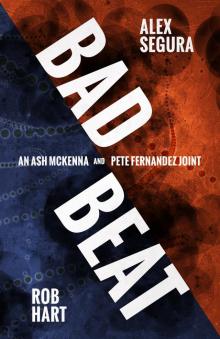 Bad Beat
Bad Beat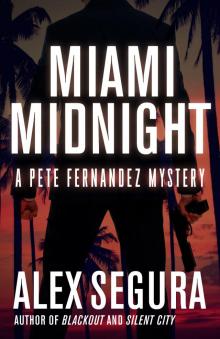 Miami Midnight
Miami Midnight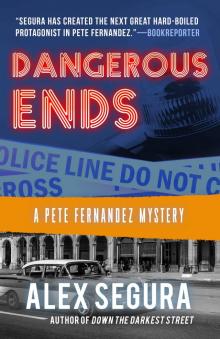 Dangerous Ends
Dangerous Ends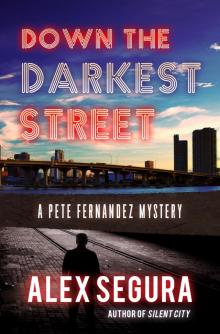 Down the Darkest Street
Down the Darkest Street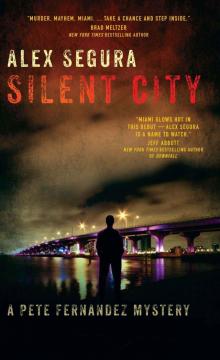 Silent City
Silent City